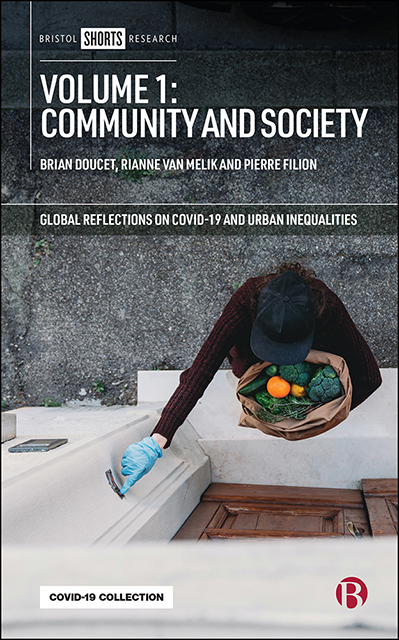Book contents
- Frontmatter
- Contents
- List of Figures and Tables
- Notes on Contributors
- Acknowledgments
- Preface to All Four Volumes of Global Reflections on COVID-19 and Urban Inequalities
- One Introduction
- Part I Working Practices
- Part II Life During Lockdown
- Part III Migration, Migrants, and Refugees
- Part IV Age, Race, Gender, and Ability
- Index
Nine - How Governments’ Response to the Pandemic Exacerbate Gender Inequalities in Belarus and Ukraine: Comparative Analysis of Minsk and Kyiv Cases
Published online by Cambridge University Press: 13 April 2023
- Frontmatter
- Contents
- List of Figures and Tables
- Notes on Contributors
- Acknowledgments
- Preface to All Four Volumes of Global Reflections on COVID-19 and Urban Inequalities
- One Introduction
- Part I Working Practices
- Part II Life During Lockdown
- Part III Migration, Migrants, and Refugees
- Part IV Age, Race, Gender, and Ability
- Index
Summary
Introduction
COVID-19 has had a devastating impact on urban life, with governments choosing various measures to mitigate its consequences. During the first wave of the pandemic, some countries, such as Ukraine, introduced a lockdown, closing airports and public places, and encouraging its citizens to quarantine. Others, like Belarus, preferred a ‘laissez-faire’ approach, ignoring COVID-19 while comparing it to the seasonal flu. This chapter analyzes the gender-related consequences of these nations’ differing approaches to containing the pandemic in their respective capital cities, Kyiv and Minsk. We consider how measures implemented in the two capitals influenced both men and women during the initial phase of the pandemic (March–July, 2020).
In the first part of the chapter, we discuss the two different national policies to deal with the pandemic's consequences. We also conducted polls in Kyiv and Minsk and semi-structured, in-depth Skype interviews with eight female professionals, four in each country (politician, gender activist, feminist activist in both countries, and ‘essential workers’: in Belarus, a medical professional, and in Ukraine, a teacher). Questionnaires contained ten questions: the topics were chosen, proceeding from the preliminary polls, and launched via Google forms. We asked female professionals about the major problems they faced because of measures introduced by the authorities to mitigate the effects of COVID-19 (overall there were 16 questions, 93 possible answers). Via deductive reasoning, we identified the following topics: efficacy of the governments’ efforts, economic pressure, an increase in household duties, psychological problems, and domestic violence. We concentrated on domestic violence as the most pressing theme. Based on the polls, we suggested the interviewees consider whether activism could be one way out of these difficult situations.
The differences between the policies in Minsk and Kyiv
Belarus, unlike neighboring countries, introduced virtually no restrictions to contain the spread of COVID-19: neither quarantine nor self-isolation were mandatory (Boguslavska, 2020). Only citizens coming from abroad were obliged to self-isolate; however, borders remained open. President Lukashenko called the pandemic ‘nothing but psychosis’ and suggested citizens protect themselves by engaging in sports or drinking alcohol (Hodosok, 2020). Amid the alarming news from other European countries, Minsk residents isolated themselves voluntarily, companies allowed employees to work remotely, and shops and cafés suspended their activities. This denial of the pandemic as a global threat was justified as necessary to maintain economic performance (Boguslavska, 2020).
- Type
- Chapter
- Information
- Volume 1: Community and Society , pp. 93 - 104Publisher: Bristol University PressPrint publication year: 2021



